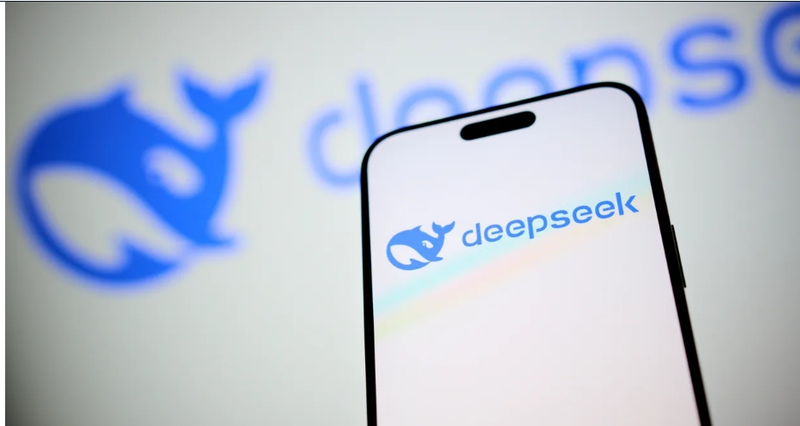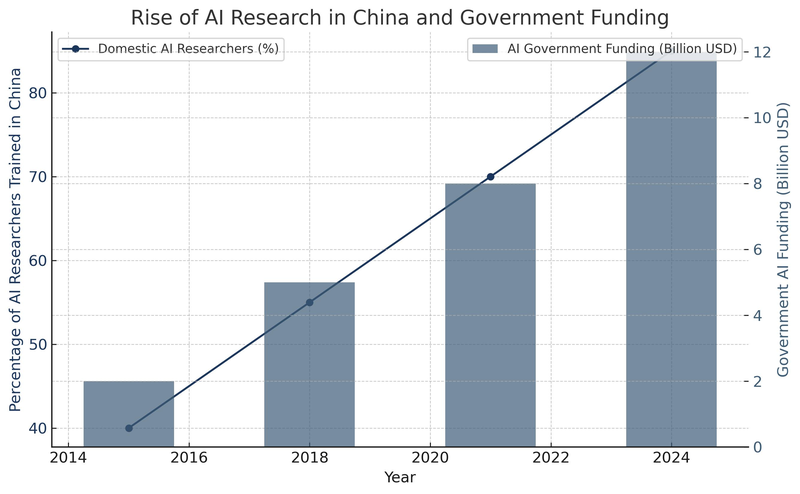DeepSeek success puts focus on China’s universities
Input
Modified
A significant change in how Chinese colleges view their own capabilities has been sparked by DeepSeek's rise to prominence as a global AI powerhouse. Chinese colleges are now proving that they can generate top-tier innovators who compete at the highest levels—without having to leave the country—instead of being perceived as needing to send their brightest minds abroad for further education and research possibilities.

1. Homegrown Talent Is Driving Innovation
The foundation of DeepSeek's success is its research and development staff, which is primarily made up of recent graduates from Chinese universities, such as Shanghai Jiao Tong University, Tsinghua University, Peking University, and Zhejiang University. DeepSeek's core team members have received all of their training within China's academic system, in contrast to earlier generations of Chinese tech innovators who frequently studied overseas before making noteworthy contributions. Their accomplishments show that China's best universities have advanced to the point where they can develop the talent required to match or even outperform their Western counterparts.
The employment policy of the organization, which places more emphasis on skill than experience, supports the rising trust in Chinese educational establishments. Because China has historically lacked "hard-core" breakthroughs, Liang Wenfeng, the founder and CEO of DeepSeek, made it clear that "top talents are underestimated in China." These skills do exist and may produce ground-breaking work without the need for foreign degrees or training, as DeepSeek is now demonstrating.
2. A Break from Dependency on "Sea Turtle"
Known as "sea turtles" (海归), many of China's leading AI researchers, engineers, and scientists studied for decades at prestigious universities in the US, Europe, and other Western nations before returning to China. This was mainly due to the perception that domestic universities lacked the state-of-the-art research facilities found in the West.
This long-held belief is called into question by DeepSeek's growth. A thorough examination of its core personnel shows that the vast majority received their training in China, with very few having any academic experience abroad. Even more interesting is the fact that the majority of the professors who served as mentors for these researchers were graduates of Chinese universities, demonstrating that Chinese academic institutions can now produce elite talent independently of Western schooling.
The AI ecosystem in China will be significantly impacted by this. With access to cutting-edge research facilities, AI-focused degree programs, and abundant funding opportunities, Chinese universities are increasingly keeping their finest students rather than losing them to MIT, Stanford, or Oxford.
3. Government Spending on Education and AI
The Chinese government has made significant investments in DeepSeek for more than ten years, which has contributed to its success. China has spent billions on AI research, education, and industrial uses since it was declared a national priority in 2017. The nation has actively developed a top-tier AI ecosystem by:
establishing research facilities for AI at prestigious institutions.
providing yearly funding to thousands of PhD students studying AI.
promoting cooperation between academic institutions and internet behemoths like Baidu, Tencent, and Alibaba.
extending computer infrastructure to accommodate ambitious AI initiatives.
Chinese colleges have been able to move from being followers to leaders in AI research because to these efforts. Institutions like Peking University and Tsinghua University are now regarded as strong substitutes for Stanford or MIT in AI research, and the AI talent pipeline is no longer dependent on overseas training.
4. DeepSeek as a Sign of China's Independence in Innovation
In particular, U.S. technological limitations on China have contributed to DeepSeek's explosive growth. The goal of export prohibitions on cutting-edge AI processors and limitations on Chinese access to Western AI models was to impede China's technical advancement. Rather, they have spurred domestic innovation, forcing Chinese businesses and universities to create indigenous substitutes.
Similar to China's successful creation of the Tiangong Space Station and the BeiDou satellite navigation system despite being shut out of Western partnerships, DeepSeek has demonstrated that China is capable of producing top-notch AI models independently of American technology. The effectiveness and inventiveness of Chinese academics educated in domestic universities are demonstrated by the models' performance, even in the face of restricted access to powerful computer resources.
5. Chinese Universities' Increasing Reputation
Universities that taught DeepSeek's researchers are likewise becoming more well-known as its AI models become more well-known worldwide. Long regarded as two of China's best universities, Peking University and Tsinghua University are currently rising in the world rankings for AI research. These universities' reputations are greatly enhanced by the fact that DeepSeek's talent pipeline is virtually exclusively domestic, which draws in top students who might have otherwise thought about studying elsewhere.
With papers from colleges like Tsinghua and Peking often appearing alongside those from MIT and Stanford, China's universities have also been more represented at important AI conferences. This change demonstrates China's academic institutions' increasing legitimacy on the international scene.
6. Preserving Skill and Mitigating Brain Drain
The success of DeepSeek points to a larger shift in China's technical development strategy, one that emphasizes independence more. It is changing the career choices of China's most talented students by demonstrating that the country can produce world-class AI advancements. More young Chinese scientists are opting to remain in China, where they may contribute to innovative projects like DeepSeek, rather than feeling the need to study overseas in order to access possibilities for cutting-edge research.
The motivation for Chinese students to seek AI education in their homeland will only increase as more businesses emulate DeepSeek. The trend of sending top talent abroad for study and research is probably going to slow down as China's institutions continue to gain international recognition and the highest governmental levels promote the development of AI.
In conclusion, Chinese universities are entering a new era.

The achievement of DeepSeek demonstrates the maturity of China's academic and research institutions and goes beyond a single company's triumph. It has increased Chinese institutions' confidence in their capacity to attract and keep bright minds by proving that domestic talent can match the best in the world.
China's best universities are now regarded as independent innovation powerhouses rather than just stepping stones to universities abroad. A new age in which Chinese institutions are at the forefront of global AI research and technological growth is replacing the days of automatically sending China's best students overseas.





















